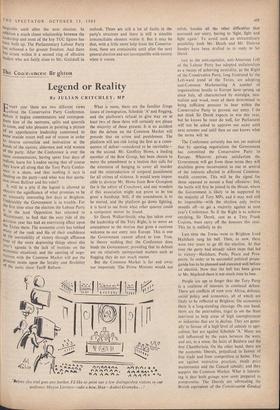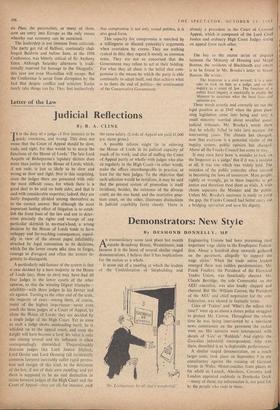The Conferences: Br.ghton
Legend or Reality
By JULIAN CRITCHLEY, MP EvEay year there are two different views about the Conservative Party Conference. Before it begins commentators and correspon- dents hint of the tantrums, splits and quarrels to come, and take pleasure in painting a picture of an apprehensive leadership summoned to sfte seaside resort well out of season in order to receive correction and instruction at the hands of the squires, aldermen and wild women Of the party. After the Conference is over the same commentators, having spent four days of tedium leave for London saying that of course they knew all along that the Tory Party Confer- ence is a sham, and that nothing it says is Diming on the party—and what was that quota- tion about Balfour and his valet?
It will be a pity if the legend is allowed to obscure the significance of what promises to be an unusually interesting few days at Brighton. Undeniably the Government is in trouble. For the first time since the election the Labour Party ,,, in the lead. Opposition has returned to westminster, to find that the easy ride of the Previous year has had an enervating effect upon the Tories there. The economic crisis has robbed many of the rank and file of their confidence In the inevitability of victory through affluence (one of the more depressing things about this Year's agenda is the lack of motions on the economic situation); and the opening of nego- tiations with the Common Market will put the greatest strain upon the loyalty and flexibility of the Party since Tariff Reform What is more, there are the familiar fringe issues of immigration, Schedule 'A' and flogging, and the platform's refusal to give way on at least two of these three will certainly not please the majority of those present. It is no accident that the debate on the Common Market will precede that on crime and punishment. The platform will not risk losing the first as a conse- quence of defeat—considered to be inevitable— on the second. Mr. Geoffrey Howe, a leading member of the Bow Group, has been chosen to move the amendment to a motion that calls for the extension of hanging to cover all murder and the reintroduction of corporal punishment for all crimes of violence. It would seem impos- sible to divorce Mr. Howe from Bow Groupism (he is the editor of Crossbow), and one wonders if this association might not prove to be too great a handicap. Still, if the amendment is to be moved, and .the platform go down fighting, it is hard to see from what other quarter could a competent mover be found.
Sir Derek Walker-Smith, who has taken over the leadership of the Tory Right, is to move an amendment to the motion that gives a cautious welcome to our entry into Europe". This is one the Government cannot afford to lose. True, in theory nothing that the Conference does binds the Government; providing that its defeats are on relatively unimportant matters such as flogging they do not much matter.
But the Common Market is far and away too important. The Prime Minister would not
'Before this trial goes any further, l'd like to point out a few distinguished• visitors in our audience: Maxim Litvinov—take a bow, Max—Andrei Gromyko
relish, besides all the other difficulties that surround our entry, having to 'fight, fight and fight again.' To avoid such an extraordinary possibility both Mr. Heath and Mr. Duncan Sandys have been drafted in to reply to Sir Derek.
Just as the anti-capitalist, anti-American Left of the Labour Party has adopted unilateralism as a means of achieving neutrality, so the Right of the Conservative Party, long frustrated by the Left-ward trend of the Tories, are adopting anti-Common Marketeering. A number of organisations hostile to Europe have sprung up since July, all characterised by nostalgia, neu- tralism and woad, most of them determined to bring sufficient pressure to bear within the Conservative Party to prevent our entry. I do not think Sir Derek expects to win this year, but he knows he must do will, for Parliament will not be asked to approve our entry until next summer and until then no one knows what the terms will be.
The Conference certainly has not yet realised that by opening negotiations the Government has committed the Conservative Party to Europe. Whatever private satisfaction the Government will get from these terms they will doubtless prove inconvenient to one or several of the interests affected in different Common- wealth countries. This will be the signal for those opposed to mount a final offensive: but, the battle will first be joined in the House, where the Government is likely to be supported by the majority of Tory MPs, and it may well still be impossible—with the election only twelve months off—to get a majority against at next year's Conference. So if the Right is to achieve anything, Sir Derek, cast as a Tory Frank Cousins, must carry off the honours this year. This he is unlikely to do.
Last time the Tories went to Brighton Lord Hailsham rang his bell. Then, as now, there were two years to go till. the election. At that time the party had already taken steps that led to victory—Hailsham, Poole, Peace and Pros- perity. In order to be successful political propa- ganda has to be planned and executed well before an election. Now that the bell has been given to Mr. Macleod there is not much time to lose.
People are apt to forget that the Tory Party is a coalition of interests in continual debate. There are conflicts of view over Africa, defence, social policy and economics, all of which are likely to be reflected at Brighton. On economics there is a long-standing cleavage. On one hand, there are, the paternalists, eager to see the State intervene to help areas of high unemployment or industries that are in decline. They are gener- ally in favour of a high level of subsidy to agri- culture,' but are against Schedule 'A.' Many are still influenced by the years between the wars, and are, in a sense, the heirs of Baldwin and the first Chamberlain. On the other hand, there are the economic liberals, prejudiced in favour of free trade and freer competition at home. They arc against restrictive practices, resale price maintenance and the Cunard subsidy; and they support the Common Market. What is interest- ing is that both groups now seem prepared to compromise. The liberals are advocating the British equivalent of the Commissariat General du Plan; the paternalists, or many of them, now see entry into Europe as the only means whereby our economy can be sustained.
The leadership is not immune from criticism. The party got rid of Balfour, continually chal- lenged Baldwin and before Suez, at the 1956 Conference, was bitterly critical of Sir Anthony Eden. Although Saturday afternoon is tradi- tionally reserved for homage to the `Osagyefo,' this year not even Macmillan will escape. But the Conference is saved from disruption by the fact that despite conflict and criticism Tories rarely take things too far. They feel instinctively that compromise is not only sound politics, it is also good form.
This capacity for compromise is matched by a willingness to discard yesterday's arguments when overtaken by events. They see nothing cynical in this; they regard it merely as common sense. They are not so concerned that the Government may refuse to act at their bidding. For what they all share is the belief that com- promise is the means by which the party is able continually to adapt itself, and thus achieve what is to them the end of politics—the continuance of the Conservative Government.







































 Previous page
Previous page